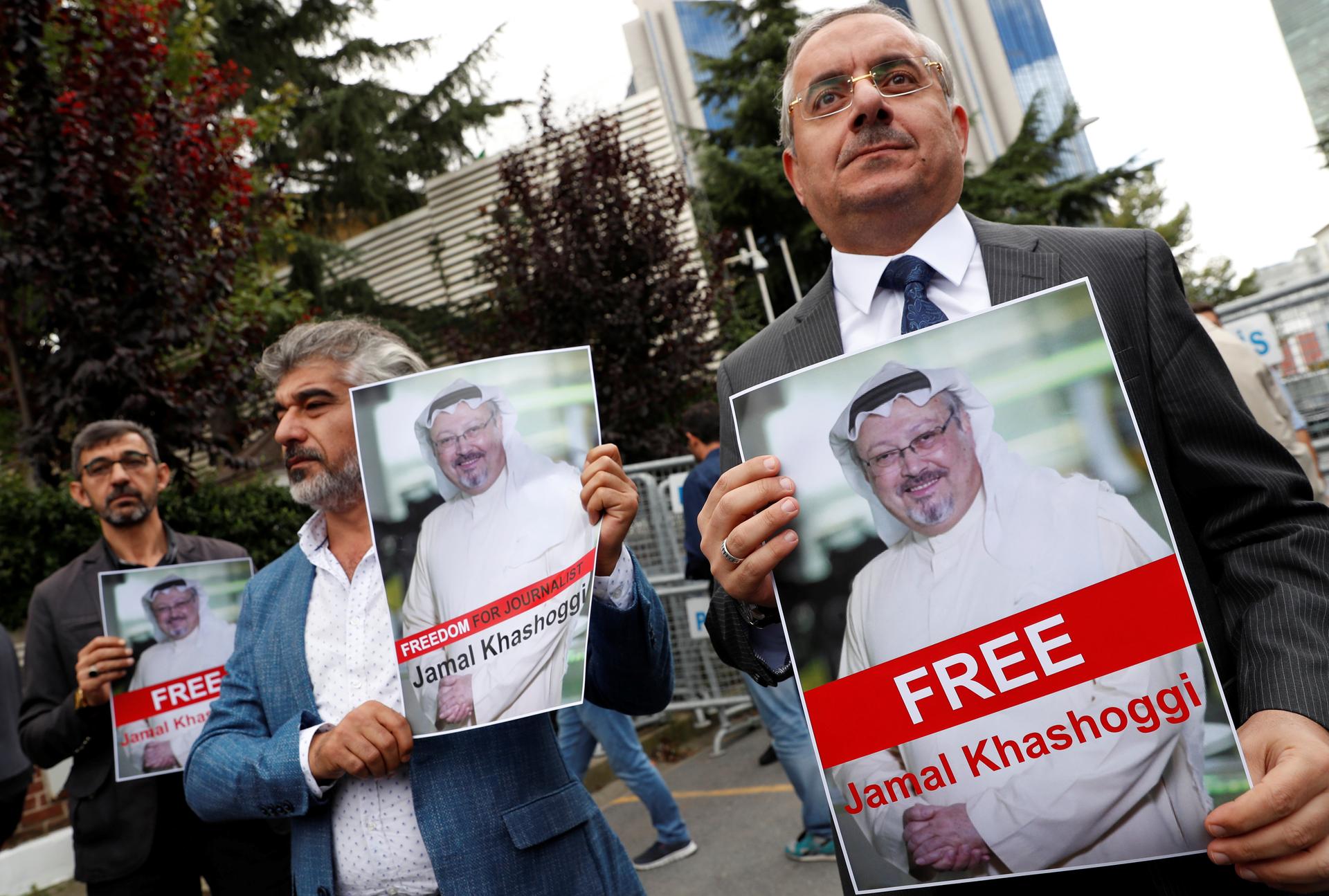Why would someone want to kill Saudi journalist Jamal Khashoggi?
Human rights activists and friends of Saudi journalist Jamal Khashoggi hold his pictures during a protest outside the Saudi Consulate in Istanbul, Turkey Oct. 8, 2018.
Jamal Khashoggi left his friends and family in Saudi Arabia and moved to the US in 2017. It had became too difficult for him to speak freely as a journalist at home. After a year of living in exile in Washington, DC, he traveled to Istanbul to marry his Turkish fiancé.
Last Tuesday, Khashoggi entered the Saudi consulate in Istanbul to get documents he needed for his wedding. He hasn’t been seen or heard from since.
Over the weekeend, unnamed Turkish officials said they believed Khashoggi was murdered inside the consulate. Amid the speculation, Turkey has asked for Saudi cooperation in an official investigation of the journalist’s disappearance.
Saudi officials reject that claim. “We categorically reject any allegations of involvement in his disappearance. The Consulate in Istanbul has opened up for a walkthrough, which reinforced that Jamal is not being held in the Consulate. He is not held and has not been harmed by the Saudi government,” the Saudi embassy in Washington, DC, said in a statement.
Salameh Nematt is hopeful that what the Saudi officials say is true. Nematt, a Jordanian journalist and analyst, is a longtime friend of Khashoggi’s. He spoke to The World’s Marco Werman about his friend and colleague.
Marco Werman: Tell us about Jamal Khashoggi. Why would anyone want him disappeared — or even killed?
Well, Jamal was — has been for a while now — a critic of the Saudi regime, although a moderate critic, but he’s very effective. Jamal and I worked together with Al-Hayat newspaper for about 15 years. At one point he was an adviser to the Saudi ambassador to Washington, Turki al-Faisal, who became also chief of intelligence. At a later stage, he had to leave the country because he felt he could no longer work as a journalist out of there because of the official pressure.
I believe that whoever wanted him to disappear is someone who wanted to silence his voice and also send a message — a chilling message — to everybody in Saudi Arabia, especially Saudi journalists who entertain dissent from the official line.
Last year, Jamal Khashoggi spoke with us here at The World about Saudi Crown Prince Mohammad bin Salman and what he hoped the young leader could do, especially with support from President Trump.
[Salman] has the total support of the American administration. This is good. It is healthy for Saudi Arabia, it will help guide Saudi Arabia into reform. But at the same time, I wish the [Trump] administration would remind the leadership in Saudi Arabia of tolerance and oppression.
Salameh Nematt, you have said that Khashoggi is viewed as a moderate critic of the Saudi monarchy. What does that mean to the Saudi monarchy — to have a moderate critic?
He’s a moderate critic by, let’s say, American standards. But as far as the Saudis are concerned, they find it much more difficult to tolerate dissent from a Saudi national than hearing criticism from the American media. Jamal Khashoggi had a lot of influence in Saudi Arabia. He had, I think, 1.6 million followers on Twitter. He is very well respected, both in the Middle East as well as in Western circles and in Washington. And so his criticism hurts certain people in the Saudi establishment because it’s effective — because it shows where the Saudis need to move on reform and because of the stories that he writes and the columns he writes, he became a dangerous dissenter.
Obviously journalists are responding to his disappearance. Some are angry; some are shocked. What are your colleagues saying?
Well, you know, a lot of my colleagues and I, we’re still holding out. Some of us are still holding out that we may still find good news about him still being alive and well. There is nothing definitive about his disappearance. We don’t know whether he’s still at the embassy or consulate, whether he was smuggled out, abducted and kidnapped to Saudi Arabia to be put on trial, or hopefully nothing worse than that. So we don’t know yet. But the fact that he went into the consulate and never actually emerged from the consulate on his own feet, the way he came in is an ominous sign. And we are very much worried. Obviously we’re just trying to hope against hope that he may be somewhere but not killed as has been reported by some Turkish officials who are also speculating on this.
Turkey is a NATO member. I mean, do you see the US getting more deeply involved in this situation?
I think we know from the current administration they are not keen on raising this banner of respect for human rights and respect for journalism. So I don’t see this administration being too aggressive in pursuing an investigation into the whereabouts of the journalist who was a resident of Washington, DC. And I don’t see the administration wanting to escalate either. So I think we’ll have to watch what Turkey does because this is going to be a key issue.
This interview was edited and condensed for clarity.
Our coverage reaches millions each week, but only a small fraction of listeners contribute to sustain our program. We still need 224 more people to donate $100 or $10/monthly to unlock our $67,000 match. Will you help us get there today?
